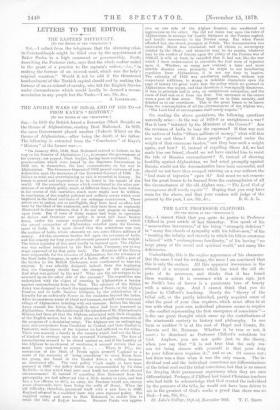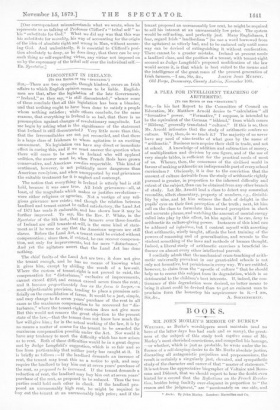THE LATE PROFESSOR CLIFFORD.
[To Tee EDITOR OF THE "SPECTATOR.")
SIR,—I cannot think that you quite do justice to Professor Clifford in your article of last Saturday. You speak of his "measureless irreverence," of his being "strangely deficient" in "many fine chords of sympathy with his fellow-men," of his "treating the infinity and eternity in which his fellow-creatures believed" with "contemptuous familiarity," of his having "no large grasp of the moral and spiritual world," and many like deficiencies.
Undoubtedly, this is the surface appearance of his character But the more I read his writings, the more I am convinced that this is only the surface. All this apparent irreverence is the rebound of a reverent nature which has tried the old ob- jects of its reverence, and thinks that it has found them wanting. It is reverence with a minus sign, just as Swift's love of horror is a passionate love of beauty with a minus sign. And I cannot think that you do justice to Clifford's teaching. Surely the "theory of the tribal self, or the partly inherited, partly acquired sense of what the good. of your clan requires, which must often be at war with what your own individual pleasure seems to require —the conflict representing the first emergence of conscience "- is the one great thought which sums up the contributions of the nineteenth century to history and philosophy. In one form or another. ;t is at the root of Hegel and Comte, Dr. Darwin and br. Newman. Whether it be true or not, it cannc be dismissed as Professor Clifford's substitute for sod. Anyhow, you are not quite just to the theory, when you say that "it is not true that the only rea- son for being sincere with yourself is that your duty to your fellow-men requires it ;" and so on. Of course not ; but there was a time when it was the only reason. The in- dividual soul and the individual conscience are differentiations
of the tribal soul and the tribal conscience, but that is no reason for denying their paramount supremacy when they are once differentiated. Perhaps, if Clifford had found Christian teachers who had faith to acknowledge that God created the individual by the pressure of the tribe, he would not have been driven to see in the greatest of God's works a proof that there was no God.—I am, Sir, &c., Si. John's College, Oxford, November 10th. T. C. SNow.
[Our correspondent misunderstands what we wrote, when he -represents us as talking of Professor Clifford's "tribal self" as his "substitute for God." What we did say was that this was his substitute for morality, his way of accounting for the origin of the idea of absolute right and wrong in Man, without assum- ing God. And undoubtedly, it is essential to Clifford's posi- tion absolutely to deny, as he does deny, that there can be any such thing as self-regarding virtue, any virtue not imposed on us by the supremacy of the tribal self over the individual self.— En. Spectator.]



































 Previous page
Previous page